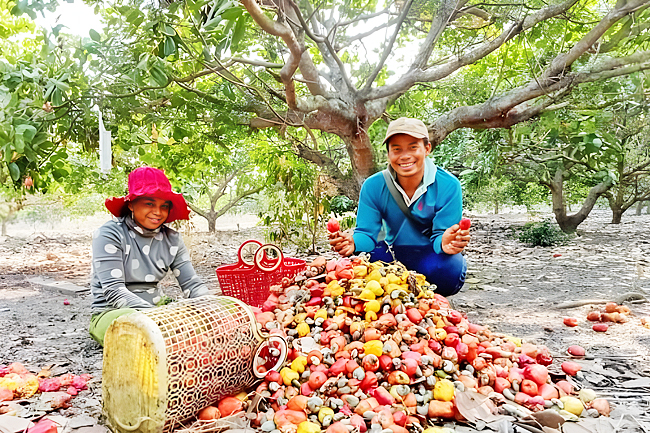ANN/THE PHNOM PENH POST – Cambodia’s renowned cashew experts have successfully cultivated four exceptional cashew variants – M-23, M-10, IM-4, and H-09 – all of which have now been officially registered by its Ministry of Agriculture, Forestry, and Fisheries.
These newly established varieties are hailed as the country’s most prized cashew selections, attaining validation from the Cashew Nut Association of Cambodia (CAC).
Cashew research and cultivation expert Var Roth San proudly explained his involvement.
“I was the cultivator of the M-23 and M-10 cashews,” he said, also naming Tal Nai Im and Kaing Siekhor as the cultivators of the other two prized varieties.
The registration process to protect these four cashew varieties was no small feat. It took years of dedication and determination, finally culminating in the ministry’s decision to officially register them in May of this year.
“Each variety has its own unique characteristics,” Roth San emphasised.
“With the support and recognition from the ministry, we cashew farmers are committed to developing new varieties that can better withstand climate change and yield more. Our goal is to make Cambodia a leading force in the cashew industry, following the inspiring words of Prime Minister Hun Sen,” he added.

The protection of these cashew varieties is vital to safeguard against intellectual property theft.
“The involvement of Agriculture Minister Dith Tina, along with professional officials, in registering and protecting these four valuable cashew varieties in Cambodia is crucial. It ensures that the new varieties we work hard to develop are maintained,” he said.
CAC President Uon Silot spoke on August 8 about the critical role of Roth San’s cultivation and registration for the protection of these cashew varieties.
“Registering these cashew varieties for protection is vital to safeguard the ones we’ve discovered. Without this protection, our neighbouring countries might take our seeds and claim them as their own. By making the effort to register our varieties, we preserve them as a part of our national identity, and that’s a positive step,” he said.
He also shared a historical insight, recalling that Vietnamese growers once claimed the IM-4 cashew variety as their own AB 29 because it wasn’t properly registered. Var Roth San and the association then took up the cause for Cambodian growers and protested until the variety was rightfully returned.
Speaking about broader agricultural concerns, Silot mentioned that the association has met with Tina twice, requesting tax exemptions and registration for newly discovered cashew varieties.
“Since we have a strong relationship with the agriculture ministry and good coordination with the minister, we need to speed up the registration to protect these varieties. If we don’t, our neighbouring countries might take them all,” he cautioned.
This momentous registration not only marks a significant milestone in Cambodian agriculture but also ensures that the integrity and identity of the country’s cashew industry are firmly established and protected.
The collaborative efforts of experts, farmers and government officials have successfully paved the way for a thriving and resilient future for Cambodia’s cashew cultivation.
Cambodia’s rich cashew cultivation tradition has expanded with the growth of seven unique cashew varieties, according to the CAC. The cultivated varieties include M-1 or SM-1, M-23, IM-4, M-10, H-09, IM-7 and SAN-1. The M23 variety leads the way, making up an impressive 70 per cent of the cashew cultivation in the country. It is followed by H09 at 10 per cent, while M1 and M10 each account for five per cent.
The remaining 10 per cent consists of ancestral varieties and those imported from neighbouring Vietnam.
These figures reflect the innovation and dedication of Cambodia’s cashew experts, and the nation’s growing prominence in the global cashew market. The cultivation of these specific varieties reinforces the country’s commitment to quality and diversity in its cashew production, officials said. – Van Socheata


